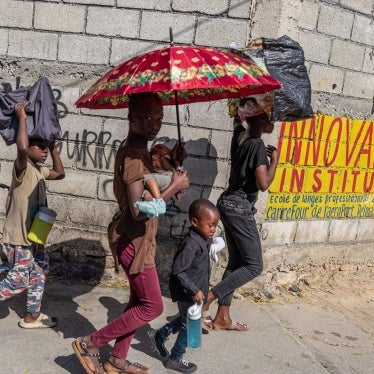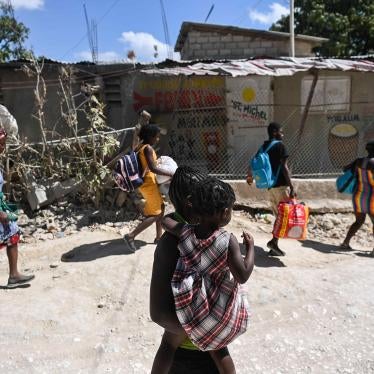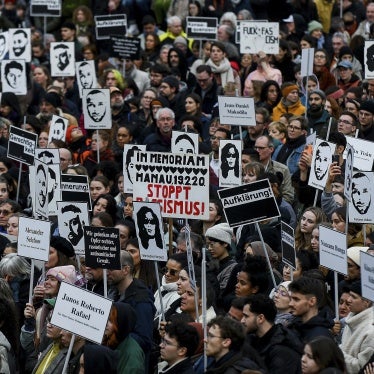Dear High-Representative/Vice-President Borrell and Commissioner Urpilainen,
We are writing to encourage the European Union to take bold, concrete steps to support the broad response needed to address all dimensions of the crisis in Haiti, including by supporting the establishment of a United Nations-authorized security support mission with all necessary human rights safeguards. Urgent action is needed to help prevent the situation from spiraling even further out of control and to ensure that Haitians’ basic rights are respected and their security and humanitarian needs are met.
In October 2023, the UN Security Council authorized the deployment of a Multinational Security Support (MSS) mission to address the dire humanitarian crisis and insecurity in Haiti. Council members also acknowledged the holistic approach needed to address the multiple dimensions of the worsening crisis.
Yet, while members of the international community have taken some steps in response, the deployment of the force and other critical components of a rights-based response are stalled and face significant budget shortfalls.
Human Rights Watch is concerned about this limited progress. On January 25, Tirana Hassan, Executive Director of Human Rights Watch, addressed the UN Security Council on Haiti, highlighting the need for a rights-based international response amid a surge in killings and kidnappings, rampant sexual violence, and a severe food crisis. Similarly, the UN High Commissioner for Human Rights, Volker Türk, has repeatedly raised the alarm about “the need for an urgent deployment of a Multinational Security Support mission to help the National Police to stop violence.”
Haiti’s crisis has reached a critical moment. Criminal groups that kill, rape, and kidnap at will, have brought transportation, health care, education and the delivery of humanitarian assistance to a near standstill across much of the country, deepening the existing humanitarian crisis. Between January and late March 2024, criminal groups killed 1,554 people not involved in the violence and injured 826 others, according to the United Nations. Nearly half of Haitians face acute food insecurity and 1.4 million people are at risk of famine, according to the UN World Food Programme (WFP). Thousands of children are out of school, and criminal groups’ use and recruitment of children is increasing. The state appears to be near collapse. Despite the efforts of the Haitian National Police, officers are overwhelmed and unable to protect people. As a result, many Haitians face grave threats to their basic human rights—including the rights to life, health, food, water, and education, among others.
A deep political deadlock is contributing to the dramatic increase in violence and its spread to previously safe parts of the country and aggravating longer-running, systemic challenges to governance, including corruption and impunity.
After political discussions led by the Caribbean Community (CARICOM), on March 11 Haitian political and civil society representatives agreed to the establishment of a Presidential Transitional Council. Prime Minister Ariel Henry, who has not been able to return to the country since early March, announced that he would resign once the new presidential council was formed. However, other actors, some linked to violent criminal groups, have rejected CARICOM’s initiative and are advocating for alternative solutions to the political deadlock, raising concerns that individuals responsible for violence and human rights abuses against the Haitian people in recent years may soon seize control of the country.
Given this context, and a long history of failed, and often abusive, international interventions in Haiti, we fear the situation in Haiti will further deteriorate if urgent steps are not taken to address the multifaceted crisis in a coordinated, comprehensive, and rights-respecting way.
The European Union is in a strong position to play a positive and supportive role in shaping the response to the Haiti crisis. We encourage you to deploy sound political engagement and consider re-directing financial support to specific actions necessary in the following key areas:
Restoring security: In light of the EU’s announcement of possible indirect support for the objectives of the Multinational Security Support mission, we encourage the EU to work with Security Council members and support initiatives to ensure the mission includes rigorous human rights due diligence and human rights monitoring, to avoid repeating failures and abuses of past interventions in Haiti.
Following the United Nations Security Council members’ promise to the people of Haiti, the EU should also consider more direct support to the UN-authorized mission by providing it with the necessary funding, personnel, and technical capacities to allow its prompt deployment and effective support to the Haitian National Police, to help restore minimum security conditions, including security for the transitional government, and the functioning of critical infrastructure.
Political transition: Following the EU’s statement that a Haitian-led “viable, inclusive and sustainable political transition” is the only path to stability, we call on the EU to use all tools at its disposal to support the establishment of the new presidential council, including supporting the vetting process of candidates through a review of information available within the framework of sanctions regimes. Once the council is established, we call on the EU to use its ability and resources to support the council’s efforts to restore basic security and hold free, fair, and credible elections within a clearly defined timetable.
Humanitarian needs: Noting that Haiti is the main recipient of EU humanitarian aid in the region, we welcome the EU’s announcement to continue its humanitarian response in Haiti. However, humanitarian organizations, including Haitian grassroots organizations, which are providing vital assistance to many Haitians at risk or in need, are running out of resources. We call on the EU to urgently provide them with more funding to help keep Haitians alive.
Justice and accountability: The EU should work with the new transitional government and UN agencies, using its existing policies and programs, to provide training and technical support to a specialized pool of Haitian judicial investigators, prosecutors, and judges who would focus on ensuring accountability for the most serious crimes committed by members of criminal groups and those supporting them. The EU should support initiatives to ensure that detention facilities are secure and humane and that criminal proceedings respect human rights. It should also support efforts to set up assistance programs for victims of violence to provide them with access to justice, reparations, rehabilitation, and psychological support.
Use of sanctions regime: We call on the EU to list under its autonomous framework for restrictive measures individuals most responsible for serious humans rights abuses in Haiti, any actor responsible for providing support to criminal groups in Haiti, as well as those allegedly implicated in high-level official corruption.
Curbing arms flows: As stated in the joint EU-Community of Latin American and Caribbean States (CELAC) declaration, the EU and Latin American and Caribbean governments should step up their collaboration and adopt stronger measures to stop the illicit flow and sale of weapons and ammunition to criminal groups operating in Haiti. The EU should ensure its member states improve enforcement of the UN arms embargo on Haiti by increasing inspections at seaports and airports. Reports of violations of the arms embargo, with a special focus on transfers of small arms, should be reported to the UN Security Council’s Haiti sanctions committee, panel of experts, and other relevant bodies.
Migration: The EU should raise its voice to condemn forced returns to Haiti as long as conditions in the country present a real risk of serious harm and human rights abuses.
Haitians need principled engagement centered on their needs right now. The EU can help by providing the necessary resources and supporting the actions outlined above to respond to the many dimensions of the crisis, allowing Haitians finally see a path toward democratic governance, basic security, the rule of law, and access to basic necessities.
Sincerely,
Ida Sawyer, Crisis and Conflict Director, Human Rights Watch
Philippe Dam, EU Advocacy Director, Human Rights Watch






